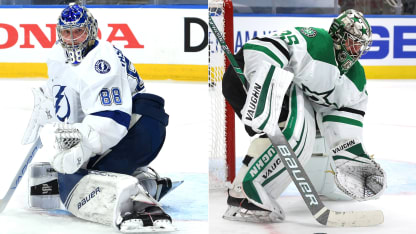So Tretiak took steps to ensure there was a place for Russian goalies to play in the Superleague, which became the Kontinental Hockey League in 2008, by introducing a non-Russian goalie tax for teams that wanted to continue importing goalies from other countries.
"The federation said, 'Go ahead and pay us money if you want to have a foreign goalie, or pay nothing and play a Russian goalie,'" said Tretiak, who was inducted into the Hockey Hall of Fame in 1989. "This is when
,
and many others appeared on the stage because many teams couldn't afford to pay and they had to play Russians. And the goalies (still) say thank you to me for that rule."
Varlamov, who played 77 games with Lokomotiv Yaroslavl in the two seasons after the rule was adopted, was the New York Islanders' No. 1 goalie in the Eastern Conference Final opposite Vasilevskiy. It was the first time three of the final four starting goalies in the NHL conference finals had played for Russia internationally. Varlamov was one of seven Russian goalies to play in the NHL this season, which matched the record set in 2014-15, and the group combined this season for 232 starts and 136 wins, each a single-season NHL record for Russian goalies.
Those numbers could grow again next season with an increase in starts for New York Rangers goalie Igor Shesterkin, who made his NHL debut Jan. 7 and was 10-2-0 with a 2.52 goals-against average and .932 save percentage in 12 games, and the expected arrival of Islanders prospect Ilya Sorokin from the KHL.
There are several other reasons for the ongoing rise of Russian goaltending, including notable improvements in position-specific coaching, but those close to the situation point to the opportunity to play provided by Tretiak's rule change as the biggest change.
"We've got to give a lot of credit to Tretiak because of the rule," said Evgeni Nabokov, who was born in Kazakhstan but played for Russia internationally and is now the San Jose Sharks goaltending coach after playing 10 of his 14 NHL seasons for the Sharks.
"First off, a goalie has to play; everything else is secondary," said Khabibulin, who played 799 NHL games over 18 seasons and now works with goalies on Russia's national teams. "Most of these guys, besides the fact they were talented and creative, a lot of it is that they all got some kind of a chance along the way to play, and they've used it."


















